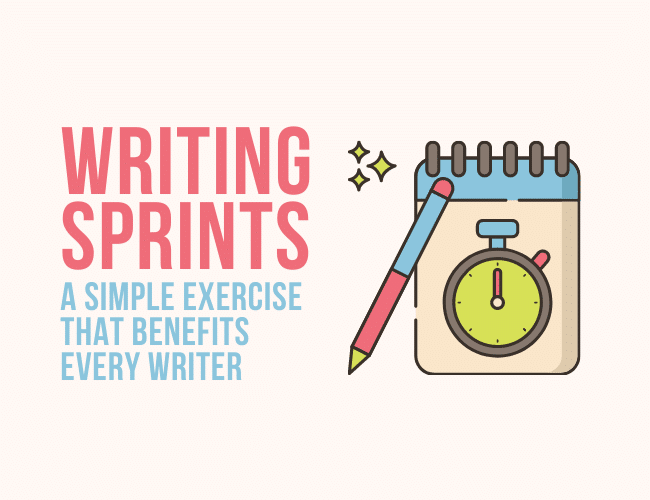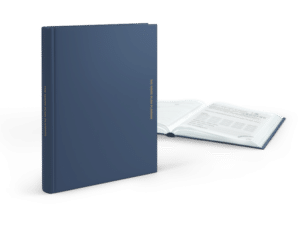How do you defeat procrastination, write more in less time, and do it with less struggle? Two words: writing sprints.

What are writing sprints? A writing sprint is when you set a timer and write as much as you can for that period of time without editing or doing anything else. See below how to use them to get your writing done fast!
Word sprints are an amazing writing tool (a secret weapon!) that you can use to improve your writing as well as your writing speed. Sprinting pushes you to write more words fast by forcing you to start writing and ignore your inner editor.
They also get you to concentrate on one of the most important ways to improve your writing life: consistent practice.
With continuous practice, word sprints can even help you develop a writing habit that will empower you to do more actual writing and finish a novel or a screenplay—and maybe even develop a career as a writer.
But what are writing sprints? And how can you use them effectively?
I’ll teach you in this guide!
Writing Sprints Combat a Writer’s Fatal Enemy: Procrastination
I’ve taught thousands of people how to develop a writing practice that works, to use that practice to write more in less time, and to finish their best novels and memoirs. And recently, I developed a three-part series to help you write more (and better), too.
But out of the thousands of writers I’ve trained over the last ten plus years, most of them have struggled in their writing in some very predictable ways: things like procrastination, writer’s block, perfectionism, lack of ideas, and other things that make their writing a miserable experience, and, ultimately, keep them from finishing their projects.
And if I’m being completely honest, I also struggle with these writing pitfalls. I’m a professional writer, but writing has never come easy for me. Just ask my teachers growing up.
Over the last couple of decades, I’ve also figured out a set of really simple tricks, writing routines, and practices that have enabled me—possibly the worst procrastinator you know—to write fifteen books, dozens of stories, and hundreds of articles.
One of these writing tips is writing sprints. Why?
Because sprints work. They’ll change your writing life—and impact your writing craft in immeasurable ways. If you do them right.
Before a Sprint, Set an Intention
Before joining a writing buddy or your fellow sprinters for a writing sprint, pause for a second. Ask yourself, “Am I entering this sprint with a focus? Do I know what I’m going to write today?”
Even if you’re a pantser, you’ll have a more positive, focused writing experience if you set an intention for each sprint.
What is an intention?
Studies on productivity and goal setting have consistently shown that when you set an intention, when you visualize what you’re going to do, when you’re going to do it, and where you’re going to do it, you’re much more likely to actually accomplish your goal.
Think about that for your daily writing. Where will your writing space be? When will it be? How long will your time limit be?
What if you started each writing session not by just pulling out a blank page and starting to write, but instead by setting a clear intention on what you’re going to accomplish that day? How much could that change your writing?
Intentions could be as simple as:
- A word count
- A page count
- A scene count
- A certain amount of time writing
- A sprint word count (amount of words in a sprint you want to meet)
To learn more about how to set an intention, sign up for my free writing practice.
But for now, just consider how participating in a writing sprint session will feel even more rewarding if you set and meet your writing intention.
The thought feels good, doesn't it?
Write Fast and Imperfectly
Most of your writing problems, whether it’s procrastination, writer’s block, or just not having fun with writing, come from perfectionism. Which sounds like a relief, right? Because then all you have to do is beat perfectionism, and you’ll be a productive writer!
Not quite. First, because perfectionism is incredibly tough to overcome.
After all, you want to write something great, something that will connect with millions of people, something that will inspire people like the books and stories you’ve loved have inspired you.
And so, perfectionism takes hold.
You write a sentence that doesn’t quite measure up to your standards and then spend a few minutes fixing it. You finally move on to the next sentence, but that isn’t right either. And then, oh by the way, is your book idea itself right? Is it original? Is it inspired? Is it working at all?
Before you know it, you’ve been staring into the distance for an hour, or worse, scrolling through social media, and all you have to show for your writing time is two lousy sentences and a handful of likes that you gave on Instagram.
There has to be a better way, right?
Most writers have to overcome procrastination at some point in their career. They can be first time writers working on a first draft, or they can be seasoned writers with multiple bestsellers on the New York Times bestseller list. They could rank high in Amazon for a certain genre. It doesn't matter.
Almost every writer, at some point, will have a moment where they'd rather do anything than write their book. Even if that itch is only temporary.
Luckily, there are writing tools to help you get around it.
The best way to do that is to write fast. Really fast. Like, as fast as you’re able, with no editing. This way, your perfectionist brain never gets a chance to judge your writing as bad.
That’s why writing sprints are so great. They don’t give you time to procrastinate. You have to focus.
You have to write. Now.
What is a Writing Sprint?
A sprint is when you set a timer and write as much as you can for that period of time without editing or doing anything else.
You can enter a sprint with a very specific focus, like a writing prompt. Or, you can use a sprint to add pages to your WIP (your current project, or work-in-progress).
You might join a sprinting group only for certain times of the year, like November for NaNoWriMo. Or you might do sprints with friends, or find a tight-niche writing community that you meet each day on your lunch break. By the way, sprints are an amazing way to get you to write each day, even while working a full-time job.
Regardless of when you sprint, it's important to track your progress in a sprint. To help you do this, I've created a worksheet for you to use, which you can download below:
Daily Word Count Tracking Sheet >> Keep track of your writing, one day at a time, with our word count tracking worksheet.
After you download it, look at your worksheet. On it, notice how there's an entire section where you can keep track of your writing sprints.
And here's the beauty of it—you choose how long you want your sprint to be. It could be twenty minutes, or even just a minute sprint. The point of the sprint is to get you to write: fast and consistently.
Say, for instance, a writer wants to sprint for thirty minutes.
This is how to use the spreadsheet:
- Set a timer. By the way, don't use the timer on your phone or a timer app, since this might distract you. Turn your phone notifications off. Use a timer on the microwave or oven—something not directly next to you. Or use a free timer on your computer like this.
- Get writing. Try to stay focused and not do anything else during that period. See how using a timer not on your phone will help with this?
- Stop when the timer goes off.
- Count how many words or pages you wrote. Don't skip this step!
Let’s say I wrote three pages. I would write that down, and it’s great. Let’s say this means that I finished my word count goal that day. It’s rewarding and encouraging.
At the same time, if you want, you can keep going and see if you can write even more during your daily writing time.
How Long Should You Set Your Timer For?
There's no perfect amount of time a writing sprint should last. It depends on how you’re feeling.
If you’re feeling really focused, you might choose to set your timer for thirty minutes or ten minutes or even do a five-minute sprint. Or take a note from the pomodoro method and set it for twenty-five minutes.
If you’re feeling really distracted or like you don’t want to write, you might do a shorter sprint.
The sweet spot for me is often three minutes, because sometimes I’m so busy and so distracted that I only have three minutes of focus in me.
On top of that, I don’t always have much will-power, but I know that I always have three minutes of will power in me. So I set my timer for three minutes and write as quickly as I can.
What Happens When the Timer Goes Off?
Ding, ding! That’s it. Your timer goes off—but are you done? What should you do next?
This is my routine:
- I stop.
- I count my words or pages to see how I did.
Why do I track this? Because measuring your output is so important. What you measure gets managed.
Notice that I didn’t suggest that you measure how good your writing is or how your writing made you feel.
Instead, measure how many words you can write in a certain amount of time. This will allow you to track your progress.
Which only gets better the more sprints you complete—the more you practice your writing.
What Should You Do After a Sprint?
You have two options: you can either decide to take a break or schedule the next time for your next sprint.
What you can’t do is go back and edit. That’s because we want to stay in our creative, productive, fast writing side of the brain. And editing will get us into our perfectionist, slow writing side of the brain.
Resist the urge to go back and edit until later.
Instead, if you feel like you’ve used up all the focus and willpower you have, take a break. You've earned it!
But chances are, now that you’ve started, you will probably want to write a little more. So then you can set the timer again, and it’s off to the races.
Once you finish two sprints, here’s where this gets really fun, because you can compare your score.
And so on.
Use Sprints to Prove Your Progress
After a few sprints, compare the worksheets you used to track your progress.
Say you write fifty words in the first sprint and 100 words in the next sprint. Well, maybe you can write 125 in the one after.
The focus can continuously be on beating your score, writing as much as you can as quickly as you can on the topic or chapter or story event that you’re working on for that day.
The benefit of this is that it brings the focus to tracking your words, not how good your writing is, which actually encourages you to write more—and the more you write, the better of a writer you’ll become.
Believe it or not, it’s the people who don’t write much who get stuck in perfectionism and who never become better writers. And it makes sense, because they’re not practicing writing.
But by focusing on quantity over quality, you actually can improve the quality of your writing faster than if you only focused on quality.
That’s why sprints are one of the best daily practices you can use in your writing. You might even call them the write practice. (Good one, right?)
So give that a try today!
Set your timer, write as fast as you can, count your words, and then, if you’re up for it, set your timer again. See if you can beat your previous score.
Do this alone or with your writing group. Regardless, get going with it and watch as you become a more productive and stronger writer.
Sprint away.
By doing this, you will not only accomplish your word count goals, you’ll be on your way to finishing your writing project—all while having more fun doing it.
Have you ever participated in a writing sprint? What did you like about it? Let us know in the comments.
 Need a complete book writing process that works? We took everything we've learned helping thousands of authors finish their books and created a step-by-step guide to write and finish your book. Check out The Write Plan Planner, the ultimate tool to help you plan, start, and finish writing your book.
Need a complete book writing process that works? We took everything we've learned helping thousands of authors finish their books and created a step-by-step guide to write and finish your book. Check out The Write Plan Planner, the ultimate tool to help you plan, start, and finish writing your book.
Discover The Write Plan Planner »
PRACTICE
It's time to sprint! For today, try out our writing sprint timer here. Before you set your time:
- Come up with your writing intention.
- Set your timer for fifteen minutes.
- Sprint!
- Use the worksheet to assess how you did.
When you're done, share your sprint and let us know how everything went in the Pro Practice Workshop.
Have fun with it!
Joe Bunting is an author and the leader of The Write Practice community. He is also the author of the new book Crowdsourcing Paris, a real life adventure story set in France. It was a #1 New Release on Amazon. Follow him on Instagram (@jhbunting).
Want best-seller coaching? Book Joe here.




0 Comments